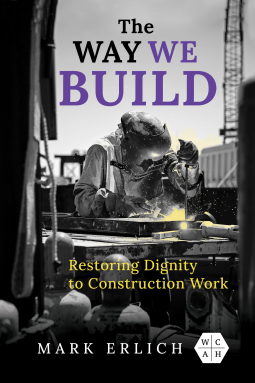
The Way We Build
Restoring Dignity to Construction Work
by Mark Erlich
This title was previously available on NetGalley and is now archived.
Send NetGalley books directly to your Kindle or Kindle app
1
To read on a Kindle or Kindle app, please add kindle@netgalley.com as an approved email address to receive files in your Amazon account. Click here for step-by-step instructions.
2
Also find your Kindle email address within your Amazon account, and enter it here.
Pub Date Jul 18 2023 | Archive Date Sep 26 2023
Talking about this book? Use #TheWayWeBuild #NetGalley. More hashtag tips!
Description
Mark Erlich blends long-view history with his personal experience inside the building trades to explain one of our economy’s least understood sectors. Erlich’s multifaceted account includes the dynamics of the industry, the backdrop of union policies, and powerful stories of everyday life inside the trades. He offers a much-needed overview of construction’s past and present while exploring roads to the future.
Advance Praise
“Having been a carpenter, dynamic union leader, and observer and writer of labor history, Mark Erlich's experience provides unique and incisive perspective on the challenges facing workers, management, and government in the construction industry. This book is required reading for anyone who cares about the future of construction and the wider community dependent on it.”--David Weil, Professor, Heller School, Brandeis University, and former Administrator, US Department of Labor Wage and Hour Division in the Obama administration
“A fascinating and incisive analysis of construction. The author’s extensive experience as a carpenter, superintendent, and union leader gives him an intimate knowledge of the industry. He shows how unions transform tough construction jobs into rewarding middle-class careers. A must-read for industry practitioners, trade unionists, and ‘future of work’ enthusiasts.”--Jeff Grabelsky, The Worker Institute at Cornell ILR School
Available Editions
| EDITION | Other Format |
| ISBN | 9780252087332 |
| PRICE | $22.95 (USD) |
| PAGES | 144 |
Links
Available on NetGalley
Featured Reviews
 Reviewer 554257
Reviewer 554257
Making comparisons with America's and Australia construction sector and learning about its history were enjoyable. I've discovered that Australia have much the same issues, and many of them are related to profiteering and dismantling unions.
The primary problem here right now is the private building inspections, which were previously the duty of the government. Due to privateers checking the buildings' security without actually entering the premises, multi-story buildings have collapsed as a result.
Shortcuts have resulted from huge construction companies now hiring tiny, independent family businesses that must compete for a job.
Teaching facilities in schools have been turned over to private enterprise, a calamity that has resulted in the employment of unqualified people without licences.
Just letting Mark Erlich see that America is not alone in a battle to correct the wrongs in building industries.
An independent review for NetGalley / University of Illinois Press



